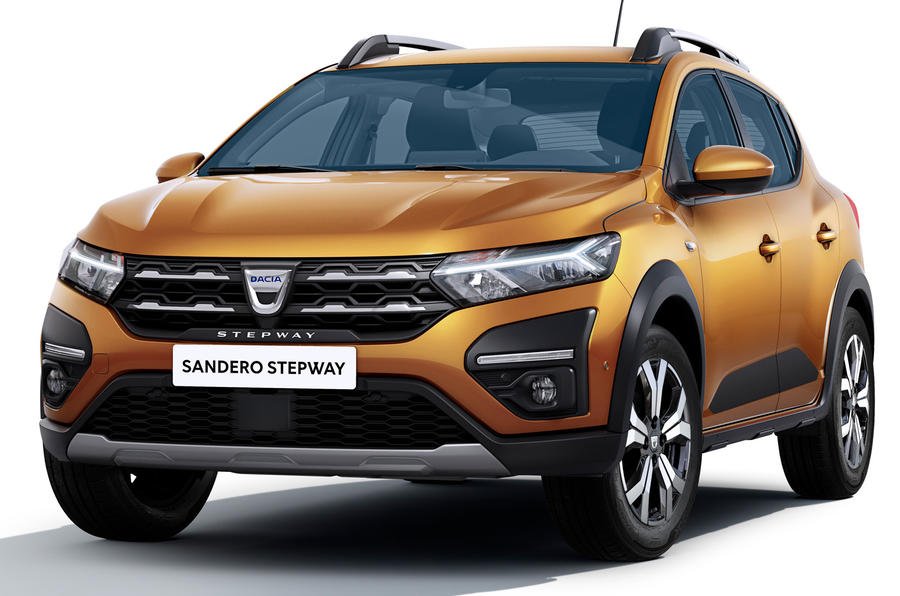2021 Dacia Sandero, Logan Revealed With Modern Comfort And Safety Tech

After a sneak preview earlier this month, the next-generation Dacia Sandero and Logan are finally here. The Sandero Stepway is joining the action with a raised ground clearance to cater to the crossover crowd. These are literally all-new cars as the Romanian brand has not only changed the platform, but it has also managed to shave off the low-cost vibe sent out by the old models by adopting a thoroughly modern design.
The trio has switched to the CMF platform used by the latest Renault Clio, unlocking a great array of comfort and safety features. Take for example the electric power steering and the LED headlights, which increase the length of the beam by 37 percent and the width by 9 percent compared to the halogen headlights used by the previous-generation models. Additional relevant examples include the emergency brake assist, blind-spot warning, park assist (with front and rear sensors, rearview camera), and even hill start assist.
As far as the engines are concerned, many will be surprised to hear the turbodiesel engine has been removed from the lineup. By dropping the tried-and-tested 1.5-liter dCi unit, it means the new Dacia models will be exclusively available with three-cylinder engines. The entry-level one will be a naturally aspirated 1.0-liter with a mighty 65 horsepower and a five-speed manual, but only for the regular Sandero and Logan. The rugged Sandero Stepway won't be sold with this basic powertrain.
Next up is a turbocharged 0.9-liter with 90 hp on tap and a choice between a six-speed manual or a continuously variable transmission. Then there's a more powerful TCe with 100 hp and a six-speed manual transmission. Interestingly, the beefiest of the three is actually a bi-fuel engine as it can run on LPG. The 50-liter liquid petroleum gas tank is located where you'd normally find the spare wheel, and corroborated with the 50-liter gasoline tank, a Sandero can travel for more than 1,300 kilometers (808 miles). The LPG version is also cleaner, averaging 11 percent less CO2 emissions than the equivalent TCe model.
Further cutting fuel consumption and emissions are the stop/start system for all three powertrains and the aforementioned CVT. The latter is an improvement over the old Easy R automated manual and brings smoother gear changes and better acceleration, according to Dacia.
The design alone is a dead giveaway the new Sandero and Logan are far more sophisticated than the aging models they're replacing. It's especially true once you virtually hop inside where the somewhat spartan look of the old cars has made way for a legitimately up to date cabin. The lower-spec cars get a remote multimedia system dubbed "Media Control" with removable smartphone support while the more expensive ones have a tablet-styled touchscreen measuring eight inches.
The proper infotainment system goes by the name of Media Display and has support for Android Auto and Apple CarPlay. Step up to Media Nav and not only do you get navigation as the name of the system implies, but even wireless Android Auto and Apple CarPlay. Depending on the infotainment, the cars come with two, four, or six audio speakers, while a 3.5-inch digital display separates the analog dials of the instrument cluster. Bluetooth and USB connectivity are standard equipment across the range.
Even though the new models will continue to be budget-friendly cars, Dacia has prepared a wide array of features. The following goodies will be available as standard or optional, depending on the market: keyless entry, heated front seats, automatic air conditioning (with digital display), reverse camera, electric parking brake, automatic wipers, and a remote trunk release. The Sandero models will also be available with a Dacia-first electric glass sunroof.
Speaking of the trunk, the Sandero can swallow up to 328 liters (11.58 cubic feet) in its cargo area while the Logan's sedan shape creates a generous 528-liter (18.6 cubic feet) luggage area. For extra flexibility, there's a height-adjustable load floor and an additional 21 liters (0.7 cubic feet) of cargo volume once you factor in the door pockets and central armrest.
It's worth mentioning the Sandero Stepway has a generous ground clearance of 174 millimeters (6.8 inches) or 41 millimeters (1.6 inches) more than the regular supermini. It gets the usual plastic body cladding and roof rails to mimic a crossover, along with beefier fenders and side moldings to enhance the tougher look. Those might look like alloy wheels, but they're actually steelies and measure 16 inches. In the case of the Stepway, there's an optional set with a diamond-cut look.
The Logan is 3.6 centimeters (1.4 inches) longer than before and comes with adjustable airplane-style tray tables with a cup holder. Another ace up the sedan's sleeve is the removable trunk organizer that splits the cargo are into four different sizes. The trunk itself is more accessible than before after Dacia lowered the load sill by 19 millimeters (0.7 inches).
Then there are the improvements underneath the revamped skin. Switching to the Clio's CMF architecture has allowed Dacia to increase the strength and rigidity of the body. There are new spars and mounts in the lower structure of the engine bay and the passenger compartment, along with door-mounted pressure sensors that trigger the curtain and side airbags in case of an impact. Side note, the door handles themselves have finally ditched the top-hinged setup for a more modern configuration.
Dacia promises the new arrivals will remain the best bang for your buck in the B-segment once the Sandero, Sandero Stepway, and Logan will go on sale in the coming months.
